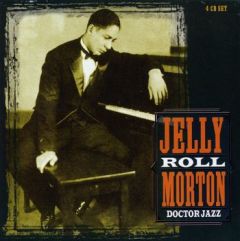Jelly Roll Morton - Doctor Jazz CD 2 (Black Bottom Stomp) [1994]
Jelly Roll Morton - Doctor Jazz CD 2 (Black Bottom Stomp) [1994]

01. Bucktown Blues 02. Tom Cat Blues 03. Stratford Hunch 04. Perfect Rag 05. King Porter Stomp 06. Tom Cat Blues 07. The Pearls 08. Sweetheart O’mine 09. Fat Meat And Greens 10. King Porter Stomp 11. Black Bottom Stomp 12. Smoke-House Blues 13. The Chant 14. Sidewalk Blues 15. Dead Man Blues 16. Steamboat Stomp 17. Someday, Sweetheart 18. Grandpa’s Spells 19. Original Jelly Roll Blues 20. Doctor Jazz 21. Cannon Ball Blues 22. Hyena Stomp 23. Billy Goat Stomp 24. Wild Man Blues 25. Jungle Blues
Jelly Roll Morton was the first great composer and piano player of Jazz. He was a talented arranger who wrote special scores that took advantage of the three-minute limitations of the 78 rpm records. But more than all these things, he was a real character whose spirit shines brightly through history, like his diamond studded smile. As a teenager Jelly Roll Morton worked in the whorehouses of Storyville as a piano player. From 1904 to 1917 Jelly Roll rambled around the South. He worked as a gambler, pool shark, pimp, vaudeville comedian and as a pianist. He was an important transitional figure between ragtime and jazz piano styles. He played on the West Coast from 1917 to 1922 and then moved to Chicago and where he hit his stride. Morton's 1923 and 1924 recordings of piano solos for the Gennett label were very popular and influential. He formed the band the Red Hot Peppers and made a series of classic records for Victor. The recordings he made in Chicago featured some of the best New Orleans sidemen like Kid Ory, Barney Bigard, Johnny Dodds, Johnny St. Cyr and Baby Dodds. Morton relocated to New York in 1928 and continued to record for Victor until 1930. His New York version of The Red Hot Peppers featured sidemen like Bubber Miley, Pops Foster and Zutty Singleton. Like so many of the Hot Jazz musicians, the Depression was hard on Jelly Roll. Hot Jazz was out of style. The public preferred the smoother sounds of the big bands. He fell upon hard times after 1930 and even lost the diamond he had in his front tooth, but ended up playing piano in a dive bar in Washington D.C. In 1938 Alan Lomax recorded him in for series of interviews about early Jazz for the Library of Congress, but it wasn't until a decade later that these interviews were released to the public. Jelly Roll died just before the Dixieland revival rescued so many of his peers from musical obscurity. He blamed his declining health on a voodoo spell. ---redhotjazz.com
download (mp3 @320 kbs):
oboom yandex 4shared mega mediafire zalivalka cloudmailru uplea
Last Updated (Tuesday, 29 December 2015 16:50)








